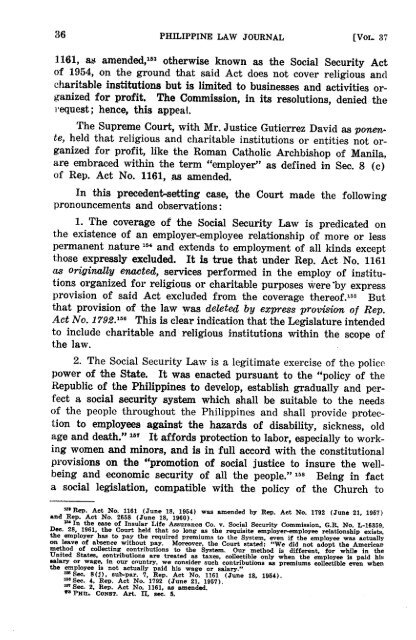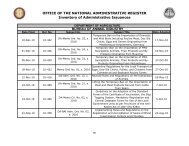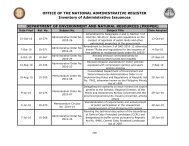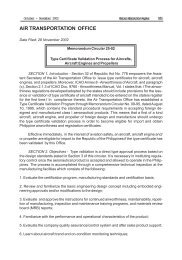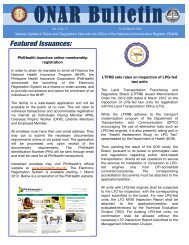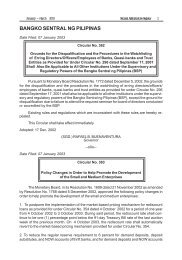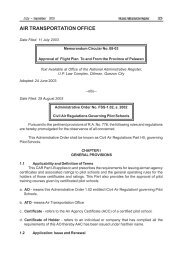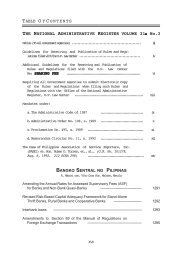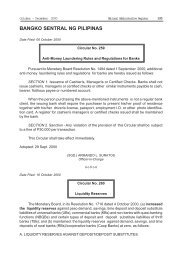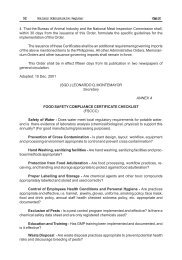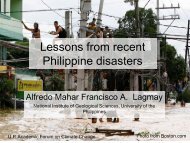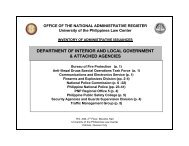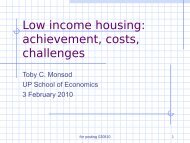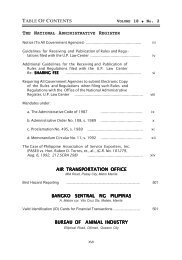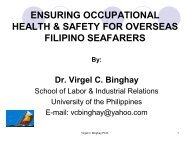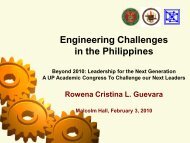PLJ volume 37 number 1 -01- Deogracias Eufemio
PLJ volume 37 number 1 -01- Deogracias Eufemio
PLJ volume 37 number 1 -01- Deogracias Eufemio
You also want an ePaper? Increase the reach of your titles
YUMPU automatically turns print PDFs into web optimized ePapers that Google loves.
1161, ~ amended,153otherwise known as the Social Security Act<br />
of 1954, on the ground that said Act does not cover religious and<br />
charitable institutions but is limited to businesses and activities organized<br />
for profit. The Commission,in its resolutions, denied the<br />
request; hence, this appeal.<br />
'fhe Supreme Court, with Mr. Justice Gutierrez David as ponernte,<br />
held that religious and charitable institutions or entities not organized<br />
for profit, like the Roman Catholic Archbishop of Manila,<br />
are embraced within the term "employer" as defined in Sec. 8 (c)<br />
of Rep. Act No. 1161, as amended.<br />
In this precedent-setting case, the Court made the following<br />
pronouncements and observations:<br />
1. The coverage of the Social Security Law is predicated on<br />
the existence of an employer-employeerelationship of more or less<br />
permanent nature 1Mand extends to employment of all kinds except<br />
those expressly excluded. It is true that under Rep. Act No. 1161<br />
as originally enacted, services performed in the employ of institutions<br />
organized for religious or charitable purposes were'by express<br />
provision of said Act excluded from the coverage thereof. 155 But<br />
that provision of the law was deleted by express provision of Rep .<br />
.4ct No. 1792. 156 This is clear indication that the Legislature intended<br />
to include charitable and religious i'nstitutions within the scope of<br />
the law.<br />
2. The Social Security Law is a legitimate exercise of the police<br />
power of the State. It was enacted pursuant to the "policy of the<br />
Republic of the Philippines to develop, establish gradually and perfect<br />
a social security system which shall be suitable to the needs<br />
of the people throughout the Philippines and shall provide protection<br />
to employees against the hazards of disability, sickness, old<br />
age and death." 161 It affords protection to labor, especiallyto working<br />
women and minors, and is in full accord with the constitutional<br />
provisions on the "promotion of social justice to insure the wellbeing<br />
and economic security of all the people."158 Being in fact<br />
a social legislation, compatible with the policy of the Church to<br />
,.. Rep. Act No. 1161 (June 18, 1954) was amended by Rep. Act No. 1792 (June 21, 1957)<br />
and Rep. Act No. 2658 (June 18. 1960).<br />
:au In the ease of Insular Life Assurance Co. v. Social Seeurity Commission, G.R. No. L-16359,<br />
Dec. 28. 1961, the Court held that so long as the requisite employer-employee relationship exists,<br />
the employer has to pay the required premiums to the System, even if the employee was actually<br />
on leave of absence without pay. Moreover, the Court stated: "We did not adopt the American<br />
method of colleeting contributions to the System. Our method is different. for while in the<br />
United States, contributions are treated as taxes. colleetible only when the employee is paid hi.<br />
&Alary or wage. in our country, we consider such contributions as premiums collectible even when<br />
the employee is not actuallY paid his wage or salary."<br />
UllSee. 8(j). sub-par. 7. Rep. Act No. 1161 (June 18, 1964).<br />
""'See. 4, Rep. Act No. 1792 (June 21. 1967).<br />
WI See. 2, Rep. Act No. 1161, as amended .<br />
••• PHIL. CONST. Art. II, see. 6.


